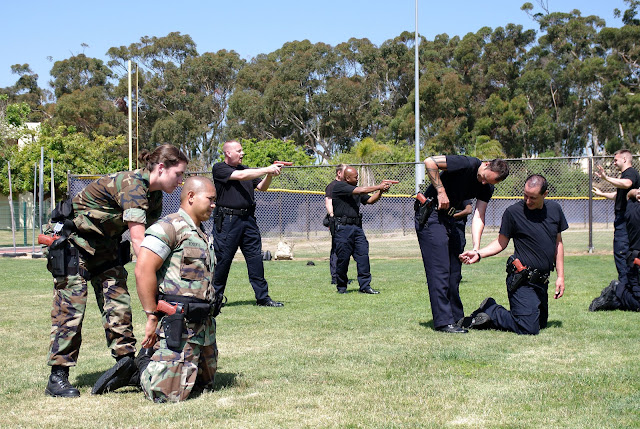Behind the Badge: Unraveling Police Officer Training Courses - A Comprehensive Guide
Are you considering a career in law enforcement? Have you ever wondered what it takes to become a police officer? Look no further, as we dive into the world of police officer training courses and uncover everything you need to know. From the different types of courses available, their pros and cons, to what you can expect during your training journey – this blog post has got you covered!
Whether you're a fresh-faced aspiring officer or someone looking to switch careers and protect their community, understanding the intricacies of police officer training courses is essential. So buckle up, because we're about to embark on an informative adventure that will demystify every aspect of this crucial step towards becoming part of our dedicated law enforcement family.
The Different Types of Police Officer Training Courses
These courses are designed to equip aspiring officers with the knowledge, skills, and mindset required to serve and protect their communities effectively. Let's explore some of the different types of police officer training courses available.
1. Basic Police Training: This is the foundational course that all aspiring officers must complete before joining a police force. It covers essential topics such as criminal law, self-defense techniques, community policing principles, and report writing.
2. Specialized Training: Once officers have completed basic training, they may choose to pursue specialized courses based on their interests or career goals. These can include SWAT (Special Weapons And Tactics), K-9 handling, traffic control, forensic investigation techniques, crisis negotiation skills, or drug enforcement operations.
3. Leadership Development: For those looking to advance in their careers or take on supervisory roles within law enforcement agencies, leadership development programs are available. These courses focus on enhancing managerial skills like decision-making, conflict resolution, effective communication strategies, and ethical leadership practices.
4. Continuing Education: In order to stay up-to-date with evolving laws and best practices in policing, ongoing education is crucial for police officers at all levels in their careers. Continuing education courses provide opportunities for professional growth by covering emerging trends in crime prevention strategies or advancements in technology relevant to law enforcement work.
Each type of police officer training course has its own benefits and considerations depending on an individual's career aspirations and personal interests.
Pros and Cons of Police Officer Training Courses
Police officer training courses come with their own set of advantages and disadvantages. Let's explore some of the pros and cons to help you make an informed decision.
On the positive side, these courses provide comprehensive training that equips aspiring officers with essential skills and knowledge. They cover a wide range of topics, including criminal law, self-defense tactics, emergency response procedures, ethics, community policing, and more. This thorough training ensures that officers are prepared to handle various situations they may encounter on duty.
Additionally, police officer training courses often involve practical exercises and simulations that allow trainees to apply what they have learned in real-life scenarios. This hands-on experience helps build confidence and enhances critical thinking skills necessary for effective decision-making in high-pressure situations.
What to Expect from a Police Officer Training Course?
When it comes to preparing for a career in law enforcement, enrolling in a police officer training course is an essential step. But what can you expect from these courses? Let's take a closer look.
From learning about criminal law and procedures to understanding community policing techniques, these courses provide the foundational knowledge needed to succeed as a police officer.
In addition to classroom instruction, practical hands-on training is also an integral part of these courses. You'll get the opportunity to practice scenarios such as traffic stops, domestic violence situations, and crime scene investigations. This practical experience helps develop critical thinking skills and prepares aspiring officers for real-life situations they may encounter on duty.
How to Choose the Right Police Officer Training Course for You
Choosing the right police officer training course is crucial for anyone considering a career in law enforcement. With so many options available, it can be overwhelming to decide which program will best suit your needs and goals.
You should research the credibility and reputation of the training institution. Look for accredited programs that have a history of producing successful graduates. Additionally, consider reaching out to current or former students to get their perspective on the quality of the course.
Next, take into account the curriculum offered by each program. Look for courses that cover various aspects of law enforcement such as criminal justice, ethics, community policing, and tactical skills. A well-rounded curriculum will provide you with a solid foundation for your future career.
Conclusion
In this article, we have demystified police officer training courses and provided you with valuable insights into what you need to know before embarking on this career path. Whether you are considering a career in law enforcement or looking to advance your skills as a current officer, understanding the different types of training courses available is essential.
We explored the pros and cons of police officer training courses, highlighting the benefits they offer in terms of skill development, knowledge acquisition, and professional growth. It is important to weigh these advantages against any potential challenges or drawbacks that may arise during the training process.
When considering which police officer training course is right for you, it's crucial to take into account factors such as accreditation, curriculum relevance, instructor expertise, practical experience opportunities, and cost. By carefully evaluating these aspects and aligning them with your own goals and aspirations within law enforcement, you can make an informed decision that sets you up for success.





Comments
Post a Comment